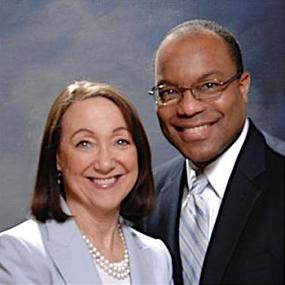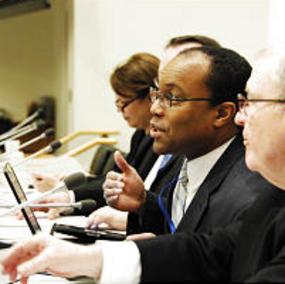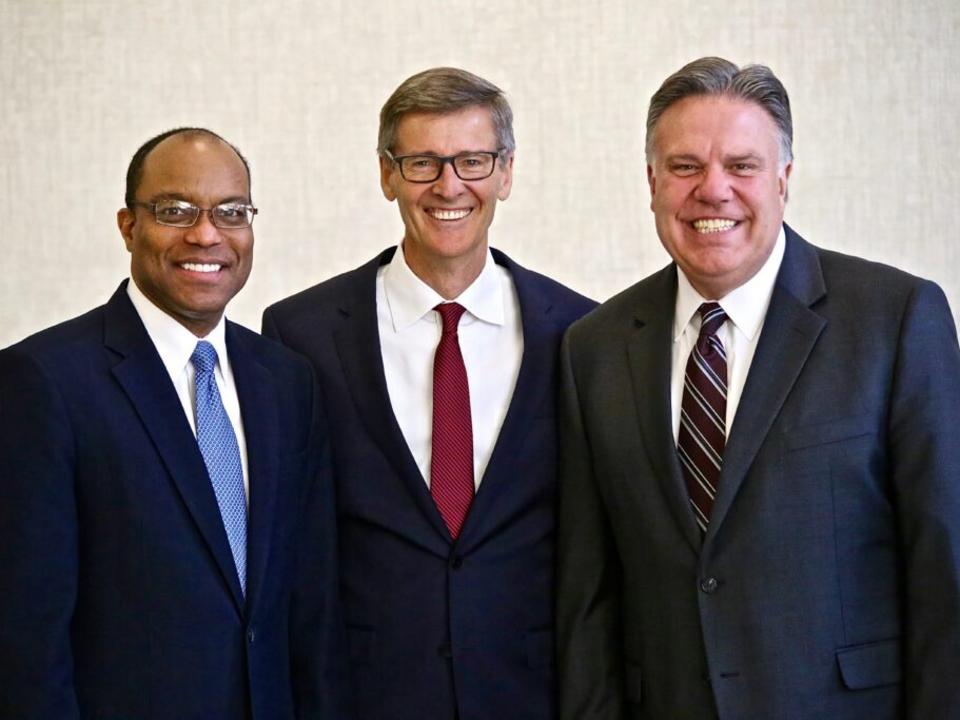- Corbitt
- Corbitt
- Young Men General Presidency
- Corbitt
- Brother Ahmad Corbitt, LDSBC
- Brother Ahmad Corbitt
| Temple Square is always beautiful in the springtime. Gardeners work to prepare the ground for General Conference. © 2012 Intellectual Reserve, Inc. All rights reserved. | 1 / 2 |
This story appears here courtesy of TheChurchNews.com. It is not for use by other media.
By Sarah Jane Weaver
In the summer of 1978, Ahmad S. Corbitt wondered if there was a God and desired to know Him.
One morning after a profound “spiritual awakening,” the teenager — determined to find answers — arose early, put on his best slacks and dress shirt, and walked to a nearby church in his West Philadelphia neighborhood. The service was a Catholic Mass. Sitting near a middle-aged white man, Ahmad realized he had only ever worshipped with other African Americans.
Still, he said, something felt right. “I knew deep inside that God loved all His children.”
Brother Corbitt — sustained April 4 as first counselor in the Young Men general presidency — has always relied on that insight from the Lord to guide and direct his life.
Raised in housing projects and row homes of Philadelphia, Pennsylvania, Brother Corbitt, 57, was born on August 16, 1962, to James Earl Corbitt and Amelia Corbitt. His youth in the 1960s was surrounded by crime, gang violence and racial tension. “It was a scary time for me as a boy, a time very much like now, where people were wondering about the future of the nation.”
But his mother’s influence was steady and strong. Her spiritual impressions guided her family — which would eventually include 10 children.
During much of his boyhood and youth, Ahmad and his family worshipped with the Nation of Islam. He was later baptized Protestant.
Then, two years after gaining a deeper understanding of God’s love while worshipping on the pew of a Catholic church, missionaries from The Church of Jesus Christ of Latter-day Saints visited Ahmad’s family — who had moved to New Jersey. The missionaries had fasted and prayed to be led to those ready to hear their message. Always spiritually sensitive, Ahmad’s mother invited the missionaries into the family’s home and agreed to take her children to church.
Brother Corbitt remembers two things about walking into the Latter-day Saint chapel: an older white sister with a loving, sincere smile greeted them at the front door, and as he sat in the chapel he was filled with a “feeling of coming home.”

Corbitt
Jayne L. and Ahmad S. Corbitt2020 by Intellectual Reserve, Inc. All rights reserved.This sister would later share her own private struggle with racial prejudice, “and there was some of this in our own family,” Brother Corbitt said.
“We were all trying to come unto Christ from where we were imperfect,” he added.
They felt loved and embraced by the local Latter-day Saints.
His mother and four of his siblings were baptized the next month. On August 16, 1980 — his 18th birthday — Ahmad also entered the waters of baptism. His stepfather, Henry Brandford Campbell, joined the Church the next year.
“It wasn’t really about us,” he said. “It was about God and what He wanted us to do. We were willing to be humble and open. He led us along.”
The Church provided Brother Corbitt with high standards. “It elevated my vision,” he said. “It helped me understand my true identity.”
At the time, Brother Corbitt’s family was one of only two black families in the congregation. They had come from a predominantly African American culture and experience, but “our conviction that this was Christ’s Church was so strong that it didn’t matter. We felt loved. We felt embraced,” he said. “And, as importantly, we loved back. We were not looking for issues or problems. We understood we were all brothers and sisters working from our different imperfections.”
Wanting to know more about his new faith, Brother Corbitt enrolled in Ricks College (now BYU–Idaho) and attended the school in 1980. There he made the decision to serve a mission and returned to New Jersey, where he worked for more than a year to earn money for his mission. In August 1982, he began serving in the Puerto Rico San Juan Mission.
Elder Corbitt was serving with his last companion, in his last area, during his last transfer, when the direction of his life grew clearer when his landlord suggested he study law. At that moment “the Holy Ghost went throughout me,” he said. “I had an absolute confirmation the Lord had an opinion about what I was to do, and this was it.”
Shortly after returning from Puerto Rico, he met Jayne Joslin on a young single adult temple trip. She was in his ward and had served as a full-time missionary in the Washington D.C. Mission. For more than two hours to and from the Washington D.C. Temple, the couple sat together and became good friends. They married on August 24, 1985, in the same temple and are the parents of six children.

Corbitt
From right, John P. Colton, Ahmad S. Corbitt, and Sharon Eubank at a United Nations event on February 27, 2014. Photo by Heather Shimmin, courtesy of Church News.All rights reserved.For the next nine years, Brother Corbitt worked to support his family by day and attended school at night, earning degrees from Stockton University and Rutgers University School of Law.
Brother Corbitt worked as a trial lawyer, in public relations and as director of the Church’s New York Office of Public and International Affairs.
In 2014, while serving as a stake president, he was called to serve as president of the Dominican Republic Santo Domingo East Mission.
After he received his call, President Corbitt hosted Elder David F. Evans, a General Authority Seventy who was then assigned as executive director of the Church’s Missionary Department and had received a weekend assignment in New Jersey.
A rare winter snowstorm turned a 25-minute trip to the airport into four hours. Elder Evans missed his plane, and the two leaders had hours to talk about missionary work.
The experience had a profound impact on President Corbitt who — with the same intensity that drove him to a Catholic pew as a teenager in West Philadelphia — approached the Lord with a desire to learn how to be the right mission president, at the right time, for his mission.
Months later he entered the Mission Leadership Seminar with a similar blank slate — “determined to implement the Lord’s agenda and the Brethren’s agenda and not my agenda. I listened in a different way and wrote what I felt.”
With faith, the Corbitts and their missionaries saw miracles in their work. Three years later, Brother Corbitt was recruited to work for the Church’s Missionary Department — helping to pilot and then implement the Area Mission Specialist program.
Brother Corbitt would also help the Church plan the June 1, 2018, “Be One” celebration, marking the 40th anniversary of the 1978 revelation on the priesthood.
The revelation occurred two years before Brother Corbitt joined the Church — the very summer that as a teenager his desire to know God had led him to a church pew and the knowledge that Heavenly Father loves all His children.
In the years since 1978, Brother Corbitt’s experience has not been free of prejudice common to African Americans in the United States. He has moved past this, he said, with the strength and peace that comes from embracing the gospel of Jesus Christ.
“The deeper you allow the gospel to sink in you, the more you consecrate yourself to the Lord, the more you see those type of offenses as the problem of those who give them,” he said. “They are not your problems. If we really are going to all come together in one in Zion — as one people, one heart, one mind — that starts and ends with embracing the gospel more and more deeply and consecrating ourselves to the Lord.”
For example, the woman who greeted Brother Corbitt and his family on their first day at church in 1980 died while voluntarily teaching Sunday School to minority youth in a different ward from her own three decades after she first met Ahmad.
Then her stake president, Brother Corbitt presided at her funeral and tearfully shared the story of her love and discipleship “that was symbolic of how we all come from different places to brotherhood and sisterhood in Christ,” he said.

Young Men General Presidency
The Young Men General Presidency. From left, Brother Ahmad S. Corbitt, President Steven J. Lund, and Brother Bradley R. Wilcox. 2020 by Intellectual Reserve, Inc. All rights reserved.Brother Corbitt began his service as a counselor in the new Young Men general presidency as the COVID-19 pandemic impacted health and economics worldwide and as racial tensions and social unrest escalated in the United States and abroad following the death of George Floyd.
The answer to these and other problems, said Brother Corbitt, is to “follow the prophet,” President Russell M. Nelson, for direction and to look forward with an eye of faith. “Unity among the human family is not natural. It’s a miracle and such great miracles require exceedingly great faith and works. It will only happen by God’s unique ways, which are higher than ours.”
At the end of the Church’s “Be One” celebration, President Nelson articulated the way that all can look forward and trust God. “It is my prayer and blessing that I leave upon all who are listening that we may overcome any burdens of prejudice and walk uprightly with God — and with one another — in perfect peace and harmony,” President Nelson said.
That, concluded Brother Corbitt, “is the prophetic vision for the Church, for the United States, and for the world.”
Copyright 2020 Deseret News Publishing Company